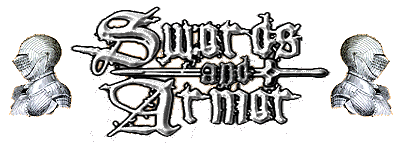
El Cid with Cross Shield - Antique

|
This Replica El Cid Medieval Shield . . . Discontinued is constructed of painted steel with brass trim. Artwork consists of a blood red cross on a cream antique crackle background. There is a brass emblem in the center consisting of castles and rampant lions. The shield size is 18" x 25" and it has a curved shape. It is the classic "Heater" style battle shield. This is a great value shield! SH926720 El Cid w/Cross Display Shield with Hanging Chain |
El Cid Campeador - Rodrigo Diaz de Vivar
Rodrigo (Ruy) Diaz de Vivar
was born around the year 1040AD in Vivar, Spain. He was raised and educated as
minor nobility in the Castilian royal court, serving the prince and future king
Sancho II, son of King Ferdinand I (the Great).
Ferdinand had a dispute with the king of Aragon. They
chose two warriors to fight and the king whose champion won was to have the
city. Ferdinand chose Rodrigo. Even though Ruy’s opponent was called the bravest
knight in Spain, the young warrior vanquished him. By this time Rodrigo was
about 23 years old. He also fought other battles alongside Sancho II acquiring
victory after victory. It is said that he never lost a battle in man-to-man
combat. This resulted in his allies and subjects giving him the nickname El
Cid Campeador, meaning chief champion.
Ferdinand I, at his death, divided his kingdom between
his children. ancho being the eldest continued to enlarge his domain, conquering
territories including those of his siblings. Sancho nominated El Cid as his
commander of the Royal troops. Legend has it that the Cid was a reluctant
supporter of Sancho’s aggression yet he played a prominent role in Sancho’s
successful campaigns against his brother Alfonso VI.
In 1072 Sancho was killed while trying to besiege his
sister’s land of Zamora leaving Alfonso as the heir and the Cid’s new boss. With
his reputation of being a successful warrior and very well liked by the
Castilians, Alfonso had no choice but to keep Rodrigo in the ranks. However, he
lost his title of Royal Commander. Afraid that El Cid might attempt to take the
throne, Alfonso made accusations against the Cid and he was exiled. This allowed
El Cid to take and fight for himself. Rodrigo became a soldier of fortunes.
Needing the Cid’s help, Alfonso tried to recall him
from exile. Ruy, instead, allowed Alfonso’s army to fight against its attackers
without the Cid’s help in hopes that the armies would become weak as a result.
This would make way for him to take on his own conquest in becoming ruler of
Valencia.
El Cid’s army had an innovative approach to planning
war strategy. They held brainstorming sessions before each engagement to discuss
tactics. The Cid often ordered military theme books by Greek and Roman authors
to be read aloud to him and his troops both for inspiration and entertainment
during battle. He was also open to input from his soldiers. He used modern
tactics that generals today would call psychological warfare.
Successfully over the next few years, the Cid
gradually tightened his control over Valencia. His moment of destiny came in
1092 when the leader of Valencia was protested against and killed. Rodrigo
immediately responded by attacking the rebel city which lasted for many months.
In May of 1094 his opponents surrendered and El Cid finally entered Valencia as
its conqueror.
Rodrigo "El Cid" Diaz ruled Valencia until he died of
natural causes in 1099 but his legend still lives on today. His life and
folklore have been portrayed in epic poems, songs, romances, plays and even a
1961 movie and a modern day video game both titled ‘El Cid’. Throughout the
ages, El Cid has been and still is noted as the national hero of Spain.
Shields Index Medieval Shields Medieval Index
More Hanging Medieval Shields For Wall Display
Swords and Armor Specials and Bargains !
New Introductions - Closeouts -
All Great Bargains
Shipping Policies and Rates - Returns
copyright
2001-2014 swordsandarmor.com . All Rights Reserved
privacy policy